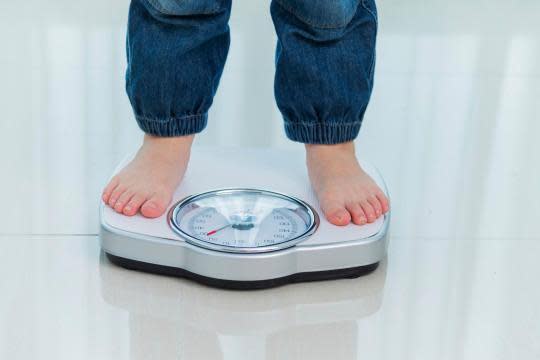How Does a 3-Year-Old Get Adult-Onset Diabetes?

A toddler in Texas was likely the youngest patient ever to be diagnosed with type 2 diabetes. (Photo: iStock)
A 3-year-old with adult-onset diabetes may have been the youngest in the world to be diagnosed with the disease.
Two years ago, a family brought their toddler, then 3 years old, to doctors at the University of Texas, Houston. The girl had excessive urination and thirst and weighed an incredible 77 pounds. Her height and weight were also in the top 5 percent for her age, says Michael Yafi, MD, director of pediatric endocrinology at the University of Texas Health Science Center at Houston Medical School, one of the doctors who diagnosed the unnamed patient.
STORY: The 2 Most Dreaded Responses to My Son’s Type 1 Diabetes
While the family had no history of diabetes, the toddler’s parents were also obese, Yafi says. He presented the case on Thursday at the meeting of the European Association for the Study of Diabetes in Stockholm, stating that he thinks this case of type 2 diabetes, also known as adult-onset diabetes, is the youngest ever reported. “At that young age, the most typical presentation of diabetes is type 1,” he tells Yahoo Parenting. “To have type 2 is extremely rare, but I have a feeling we will see more and more [cases] because kids are becoming obese earlier and earlier.”
Type 2 diabetes, which is linked to obesity, is most commonly seen in adults, though doctors have seen an increasing number of cases in teenage patients. Yafi says one reason for presenting the case this week was to alert doctors that the disease is a possibility in children as young as 3 and that they should be screening for it when appropriate.
STORY: How Sugar May Affect Kids Differently Than Adults
In the case of the 77-pound toddler, Yafi says she had a poor diet and was fairly inactive. “Most of her family dinners were food from outside restaurants and not cooked at home, she didn’t have enough vegetables and fruit, and she was eating candy all the time,” he says. “I was reasonable with the mom, and I told her the first step is being realistic and simply preventing the child from gaining any more weight. If you do that, she will keep growing and go back to being normal weight. The mother was very smart and made major lifestyle modifications for her daughter. She started cooking at home, making salads and vegetables, and eliminating sugar drinks, and she started making the child more active.” Doctors also put the young girl on a liquid form of the diabetes drug metformin.
Six months later, after a change in her diet and an increase in activity — including learning how to swim — the toddler had lost 25 percent of her body weight and was off the medication. “Two years later she is healthy,” Yafi says. “We still see her because the possibility of the diabetes returning is always there, but her BMI is back to normal.”
Yafi says he considers this case a success story. “It’s a great example of how lifestyle modifications can reverse the disease,” he says.
But David Nathan, MD, director of the Diabetes Center at Massachusetts General Hospital and a professor of medicine at Harvard, says this girl’s story should also be considered a cautionary tale. “With kids gaining weight the way they are, this is a real risk,” he tells Yahoo Parenting. “It’s very rare that it would happen in someone so young, but that said, we need to take responsibility for our children.”
With kids as young as 3, it’s up to parents to be sure they are eating healthy and getting enough activity, Nathan says. “I would hope parents wouldn’t let their kids ride a bike without a helmet,” he says. “And letting them overeat and sit in front of the television all day is the nutritional equivalent of not only riding without a helmet, but encouraging them to ride in the fast lane.”
Since adult-onset diabetes is still relatively new in children up to age 18, Nathan says it’s still unclear what the long-term effects may be. “It is only in the last 10 or 20 years we’ve started to see this change of obesity in childhood and adolescence,” he says. “Now a third of kids are overweight, and we don’t quite understand the full long-term consequences yet. We don’t understand yet the effects it will have when this girl is 10 or 20.”
Diabetes in children is especially concerning, since the longer you have it, the more damage it can cause, Nathan says. “Having diabetes for a long time means it’s more likely that you will develop vision problems, heart disease, kidney failure,” he says. “If we have shifted the population to a point where kids are starting to get it earlier, then they are more vulnerable to the complications over a lifespan.”
And while doctors know how to reverse the disease — as was the case in this 3-year-old — that gets more difficult in an increasingly obese population. “We know how to treat it, but the epidemic is overwhelming our ability to do so,” Nathan says. “It’s a sobering problem. One would hope this girl’s story will get parents’ attention.”
That doesn’t mean children can never enjoy dessert, Yafi says. “Parents don’t need to panic. Kids can still eat candy or birthday cake, but everything should be in moderation,” Yafi says. “When you have a kid eating candy, drinking sugar-flavored water and juices, having soda at school instead of water, and eating fried food all the time, that is where it can be a problem.”
Please follow @YahooParenting on Facebook, Twitter, Instagram, and Pinterest. Have an interesting story to share about your family? Email us at YParenting (at) Yahoo.com.

